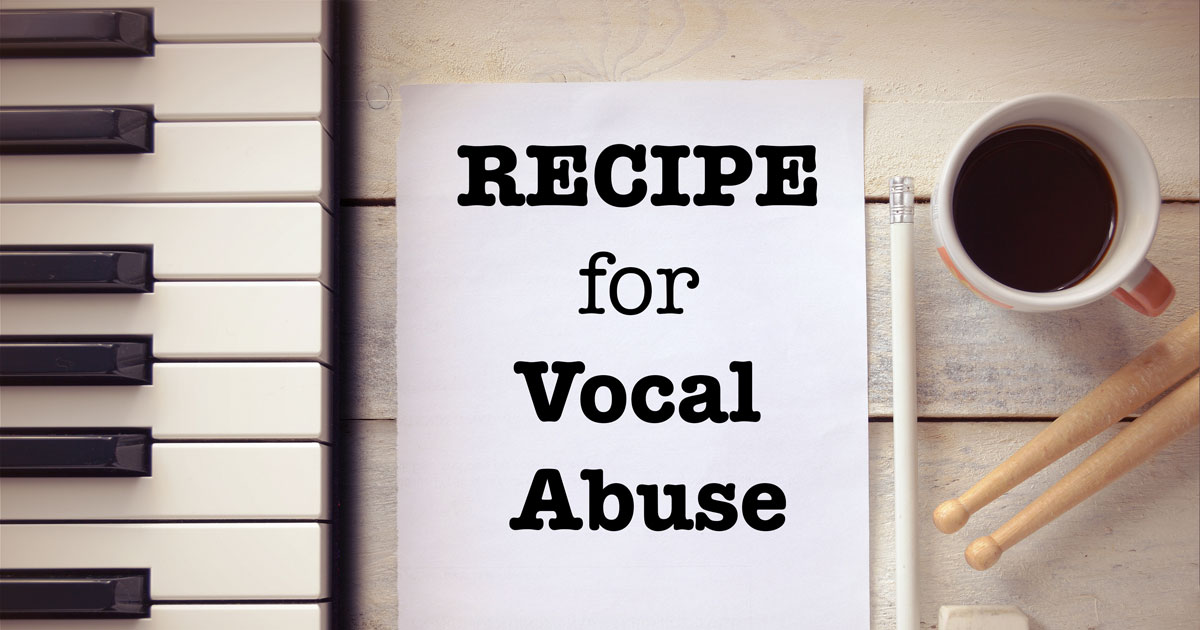Vocal Abuse Recipe | Singing Tips

Sometimes you don’t realize what you have until it’s gone. So, as a singer, what do you possess that you would miss if it were suddenly taken from you? The obvious answer to the question is your voice. As you sing, you use your voice to communicate the message of the song to your audience. Even a slight impairment of the voice can hinder the tone quality of a song. That makes the voice a valuable asset which the singer should guard and handle with extreme care to avoid vocal abuse.
What is vocal abuse?
The professionals at the Comprehensive Concepts in Speech & Hearing in Cincinnati, OH define vocal abuse as “any behavior or occurrence that strains or injures the vocal folds (or vocal cords).” However, s
Over the years in the ministry, I’ve seen vocal abuse and misuse happen. Sometimes it’s unintentional but at other times it’s as if it’s permitted. It wasn’t too long ago that one of my singers came to me and said, “better not schedule me to sing next Sunday.” When I asked why she proceeded to tell me she was going to be at camp all week. She already knew she wouldn’t have a voice by the end of the week. In addition, another man told me he had volunteered to coach basketball. He realized after coaching his team in a noisy gym he would have very little voice left. In both cases, vocal abuse seemed to be inevitable.
So, how can scenarios like this be prevented in the future? Avoid situations where you might compromise your voice and familiarize yourself with the causes of vocal abuse.
Causes of vocal abuse
- Poor breath support when speaking or singing
- Straining by speaking in an abnormally low- or high-pitched voice
- Extreme shouting, screaming or yelling for periods of time
- Vocal use when ill or tired
- Poor posture when speaking or singing
- Excessive talking without resting the voice – 90/10 rule
- Dehydration – lack of water intake / dry-air room
- Throat clearing
- Coughing
- Unhealthy lifestyle
- Poor diet – limit caffeine, sugars, and spicy foods
- Lack of proper ventilation while sleeping
- Worry or stress – constant emotional tension from circumstances
- Utilizing “old wives” remedies which are unproven
Symptoms of vocal abuse
Just like any other health concerns, there are early warning signs of vocal abuse. The National Institute on Deafness and Other Communication Disorders has provided a short list of questions to determine if you may have a voice problem.
- Has your voice become hoarse or raspy?
- Have you lost your ability to hit some high notes when singing?
- Does your voice suddenly sound deeper?
- Does your throat often feel raw, achy, or strained?
- Has it become an effort to talk?
- Do you find yourself repeatedly clearing your throat?
I think every one of us has at some time or another been guilty of misusing our voices. Therefore, if we’re not careful, we may ruin our ability to sing and minister for the Lord. Take the necessary precautions to protect your God-given gift. Furthermore, if you’re having trouble with any of these symptoms consult a physician who specializes in the ears, nose, and throat. Doing so will assure thatyour voice continues to be healthy for years to come.